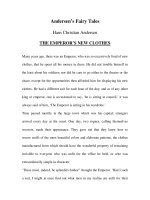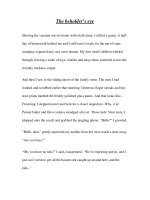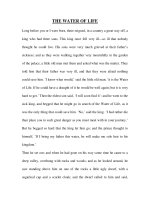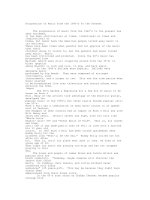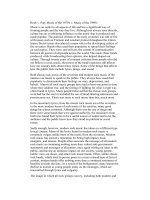the boxcar children the mystery of the pirate''s map
Bạn đang xem bản rút gọn của tài liệu. Xem và tải ngay bản đầy đủ của tài liệu tại đây (1.34 MB, 72 trang )
2
The Mystery of the Pirate’s Map
GERTRUDE CHANDLER WARNER
Illustrated by Charles Tang
ALBERT WHITMAN & Company, Chicago
3
Contents
CHAPTER
1 Benny’s Discovery
2 The Legend of John Finney’s Treasure
3 Benny Becomes Famous
4 Lots of Stairs and Millionaires
5 An Unwelcome Visitor
6 Danger, Danger, Everywhere
7 The Helpful Mr. Ford
8 The Final Offer
9 What You See Is What You Get
10 Good News All Around
About the Author
4
CHAPTER 1
Benny’s Discovery
It seemed like an ideal afternoon for a walk on the beach. The sky was blue, the
breeze was warm, and the ocean was calm and peaceful. The only thing that kept it from
being perfect was the mess the storm had left behind.
“Yuck, more seaweed!” six-year-old Benny Alden said as he stepped over another
ragged green pile of it. Watch, the Aldens’ dog, tagged along behind Benny.
“And more of these little black shells, broken open,” ten-year-old Violet added.
She picked one up between her thumb and forefinger. “What are they, anyway?”
“I think they’re called mussels,” Jessie said. She was twelve years old and had
long brown hair. “I’ll bet the seagulls are happy they’re here. Now they’ve got plenty to
eat.”
Benny smiled. “There’s nothing wrong with that!” he said. The others laughed.
Benny had a very healthy appetite.
“Tom would know what they are,” Jessie continued. “He knows a lot about this
area.”
Tom was Tom Harrison, a retired elementary school teacher and an old friend of
the children’s grandfather. He owned and ran a bed-and-breakfast a few blocks inland,
and he had invited the Aldens to visit for a week. Grandfather hadn’t seen him in years,
and the children were thrilled at the idea of spending some time along the shore. So
Grandfather cheerfully accepted his old friend’s invitation. The two men were back at the
house now, catching up on old times.
“The storm must’ve been pretty bad,” Henry commented, walking behind
everyone else. He was tall and thin, and at fourteen he was the oldest child. His full name
was Henry James Alden. He was named after his grandfather, James Henry Alden. “I
guess that’s why there are hardly any sunbathers here today. There’s no place to lie
down.”
There were all sorts of things from the sea scattered on the beach: thousands of
broken shells, small stones, seaweed clumps, and chunks of rotting driftwood. Tom had
mentioned that storms were common along the shore. This one had hit the night before
the Aldens arrived.
“Oooh! Here’s a pretty one!” Violet said excitedly. She crouched down and
picked up a perfectly formed shell. Then she put it in the plastic bag she had brought
along.
5
“Do you think you have enough yet?” Jessie asked.
“Hmm . . . almost,” Violet replied. She had offered to make seashell necklaces for
everyone, and now the children were searching for all the perfect shells they could find.
Violet was always doing artistic things. She liked to draw and usually brought a pad and
coloring pencils with her whenever the Aldens traveled. Her favorite color was, of
course, violet.
The Alden children lived with their grandfather in a large and beautiful house
back in Greenfield, Connecticut. But there was a time when an abandoned boxcar was
their home. After their parents died, they had no place to live. Then they discovered the
old train car in the woods. While they were living in it, their grandfather came looking for
them. They hid from him, thinking that he was mean. But they soon found out that he
wasn’t mean at all.
He took them back to Greenfield and brought the boxcar, too. He put it in the
backyard so the children could visit it anytime they wished.
Although there weren’t many sunbathers on the beach, there were other people
walking around. A few were wearing headphones and carrying metal detectors. Benny
had been watching them for a while. As one man knelt down and dug into the sand,
Benny asked, “What is that man doing?”
A stranger’s voice answered, “He’s looking for buried treasure!”
Benny said, “Buried treasure? You mean like gold or something?”
The man shrugged. “Gold, silver, whatever.”
“And what are those things you both have?” Benny asked.
“Metal detectors,” Henry answered, “I think. . . .”
“That’s right,” the man answered, and gave Benny a smile. “It’s called a metal
detector because . . . well, because it detects metal.”
“That means it finds metal, right?” Jessie asked.
“Yep. You wave it back and forth just above the ground, and if there’s anything
made of metal under the sand”—he tapped his headphones—“you hear a beeping sound
in here.”
Benny looked around the beach at the other people who had metal detectors.
“Have you found anything today?” he asked.
The man reached into his pocket and produced two silver coins.
“Do you think they’ve been here for a long time?” Henry asked.
The man nodded. “Probably.”
“Then how come no one else with a metal detector found them before today?”
“The storm,” the man answered. “Whenever there’s a big storm, new things
always show up, things that may have been buried too deep for the metal detectors to
pick up before. It happens all the time. That’s why all the metal-detector people are out
6
today. This is the best kind of day to find stuff.”
Benny’s eyes twinkled. “Boy, I sure hope I find some old coins!”
The man laughed. “You might; you never know. You just have to keep your eyes
open and pay attention as you walk.”
He took another drink from his water bottle. “Well, I’ve got to get back to work.
Who knows what other little treasures are lying underground, just waiting for someone
like me to find them? Good luck.”
“You, too,” the children said, and the man walked off.
“Oh, boy, old coins!” Benny squealed as they all went back to their seashell
search. Suddenly the sand was ten times more interesting to him.
Violet and Jessie both found a few more shells. Henry didn’t have quite as much
luck. And Benny, off by himself a few yards from the others, kept a close watch for
anything that looked like it was made of metal. Shells were suddenly the last thing on his
mind.
As he walked around the side of one particularly large rock, something round and
shiny caught his attention. He reached down and grabbed it. Then his shoulders slumped
with disappointment—it was nothing more than an old bottle cap. He stuffed it into the
pocket of his shorts so he could throw it into a garbage can when he got back to the
boardwalk.
He was just about to turn away when something else caught his eye. It wasn’t
round and shiny like an old coin, but it still looked interesting. It barely stuck out of the
sand and was hiding in the dark space between two huge rocks.
He dropped to his knees and began digging.
“Benny, what are you up to?” Henry asked curiously.
“I’m digging.”
“Digging what?”
“I don’t know. It feels like it’s made of . . . of glass.”
“Glass?” Jessie said, slightly alarmed. She was always watching out for her
brothers and sister. Although she was only twelve years old, sometimes she acted and
sounded much older. “Be careful, Benny. It might be broken. You could cut yourself.”
“Maybe you shouldn’t—” Henry started to say, then Benny suddenly rolled
backward. His prize was in his hand.
It was a bottle.
“Oh, my goodness!” Violet gasped.
“Wow,” Henry said softly.
“Look how old it is!” Jessie exclaimed.
What Jessie said was definitely true—the bottle was very, very old. It didn’t have
a nice, neat shape like the bottles the children were used to seeing. And it was sealed
7
shut, but not by a cap. Instead there was a rotting cork stopper in the hole.
“Let me see,” Henry said, kneeling down next to his brother. Benny handed it to
him without taking his eyes off it.
“Hmmm,” he said thoughtfully, wiping away the sand. “Looks pretty old. I’ll bet
this thing is—”
Then Henry stopped talking, and the others stopped moving. They all saw it at the
same time. . . .
There was a piece of paper inside.
“Wow,” Henry said again. “Look at that!”
Benny got up and brushed himself off. He took the bottle back and looked closely
at the piece of paper inside. It had turned brown and was cracked around the edges.
“What do you think it is?” he asked.
“I don’t know, but we’ll have to take out whatever’s in the neck to get it,” Henry
said.
8
9
“Can we go back to the house now?” Benny asked excitedly.
“Sure,” Henry answered, “let’s go.”
The Aldens began walking back, with Benny in the lead. He was skipping along
happily with the bottle in hand.
Just before they reached the boardwalk, a woman holding a camera came up to
them. She was dressed in long pants and a dark overcoat. This seemed strange to the
children because it was such a hot day, but no one said anything.
“What have you found there, young man?” she said to Benny. Her voice was very
loud. “I noticed you digging over by the rocks!”
“Ummm . . . I found a bottle,” Benny told her, holding it up.
“Wow, that looks like an old one!” the woman said. “Can I take a picture of it?”
Before anyone had a chance to answer, the woman pulled the camera to her face
and clicked off two shots.
“I like to take pictures around the beach,” she told them. “I don’t sell many, but
I’d like to. There are lots of pretty things to photograph around here!”
Then she turned and hurried away.
The Aldens looked at one another. Jessie said, “She seemed a little strange.”
“You’re right,” Henry agreed. “Well, let’s get back and see what’s inside the
bottle.”
10
CHAPTER 2
The Legend of John Finney’s Treasure
Tom’s bed-and-breakfast, which also happened to be the house in which he lived,
was very large and very old. It sat on a sunny, tree-lined street a few blocks from the
beach. A painted sign near the sidewalk said, THE SEA BREEZE MANOR,
ESTABLISHED 1919. ALL ARE WELCOME.
The children went up the walk with Benny still in the lead. Then they went into
the lobby and shut the door quietly behind them. Henry tapped the little silver bell on the
counter. A moment later a man appeared from behind a curtain. He was small and
roundish, and he had a full head of white hair. The children’s grandfather was right
behind him.
“Hello, kids!” Tom said. He had a wonderful smile, and it matched his sweet and
jolly personality. He was everybody’s friend, and he loved people. He told the children
that this was the main reason he had bought the bed-and-breakfast. He got to meet new
and interesting people all the time.
“Did you all have a good time at the beach?” he asked.
“We sure did,” Henry replied.
“Did you find enough shells for your necklaces, Violet?” Grandfather asked.
Violet held up the bag. “I might be a few short, but I can always go back.”
“Shells weren’t the only thing we found,” Henry added.
“Oh?” said Grandfather.
“Benny found something, too. Show them, Benny.”
“Look at this!” he said proudly, holding up the bottle.
The two men leaned over the counter to have a look. Tom pushed his glasses up.
“Wow, that’s a really old one!” he said.
“Where did you find it, Benny?” Grandfather asked.
“It was between two big rocks. Only the top of it was sticking out. And look at
this!” Benny said. He turned the bottle so Tom and Grandfather could see the little piece
of paper curled up inside.
“What’s that?” Tom asked.
“It’s a small piece of paper,” Jessie answered, “but we have to get the bottle open
to see what’s written on it.”
11
Grandfather took the bottle from Benny and looked at it. “The cork is so old that
it would probably break if I tried to pull it. But I’ll bet I could grind it out with a
screwdriver.”
“I’ll go get one,” Tom told him.
After Tom brought back the screwdriver, Grandfather pulled a lamp over to a
nearby table and sat down. The others gathered around him. He stuck the head of the
screwdriver into the neck of the bottle and began grinding out the cork. It was so old and
dry that it broke apart easily. Once the neck tube was clear, Tom brought over a long pair
of tweezers from his desk.
“I used to use these when I built ship models inside bottles,” he told everyone.
“Oh, so that’s how that’s done,” Violet said. She thought someday she’d like to
try that.
Slowly and carefully Grandfather brought out the old piece of paper. Once it was
on the table, he turned on the reading lamp, which was very bright. The children moved
in closer. Then Grandfather gently unrolled the paper, and everyone gasped.
The paper had turned dark brown over the years, but the drawings on it were still
clear. There were some trees, a few rocks, and some squiggly lines that seemed to imply
water.
But it was the dotted line that grabbed everyone’s attention. It started at the top of
the paper and curved off to the left until it reached the trees. And that’s where the X was.
A very large, very dark X.
12
“Oh, my goodness!” Violet said.
13
“This looks like . . . well, like a treasure map, or at least part of one,” Grandfather
said. “And what’s this here?”
In the bottom right-hand corner, written in letters so tiny that it almost couldn’t be
seen, was the name “J. Finney.” Next to it was the number “4.”
“J. Finney. Who’s that?”
All eyes turned to Tom. “You know, it does sound a little bit familiar, but I can’t
really—Hey! I wonder if it could be . . .”
His voice trailed off as he hurried out of the room. The others followed him into a
little sitting area at the front of the house. On the coffee table were several books about
the history of the town.
Tom plopped onto one of the couches and picked up a large black book with the
title Cherrystone Harbor, Yesterday and Today on the cover.
“If I remember right, there was a little story in here about—yes! Here it is!”
He put the book flat on his knees so everyone could see. On the left-hand page
was the heading “John Finney.” Underneath were a few paragraphs of text. On the other
page was a painting of Finney. He was standing on the deck of his ship with his hands on
his hips. His long hair was as black as night, as was his tangled mustache. His eyes
looked mean, but his mouth was curved in a smile.
Tom handed the book over to Violet and said, “Why don’t you read it for us,
young lady?”
Taking the book onto her own lap, Violet smiled and swept her hair back behind
her ears. “‘John Alexander Finney was one of the most colorful and eccentric pirates who
ever sailed the high seas,’” she began.
Benny’s eyes widened. “Wow! A real pirate!”
Violet continued, “‘He was the captain of his very first ship when he was only
nineteen years old, and by the time he was twenty-five he had sailed halfway around the
world. He was best known for his wild behavior. He and his men would dock at any port
that caught their fancy and go inland for days, causing all sorts of trouble. Like all
pirates, John was not only a sailor but also a thief. During his lifetime he stole hundreds
of thousands, maybe even millions, of dollars’ worth of gold, silver, and jewelry.
“‘When he got older, he decided to hide all the treasure he’d stolen over the years.
Then he drew a map that showed its exact location. But he didn’t want anyone to find it
too easily, so, during his last sailing journey, he cut the map into four pieces and hid each
piece in a different part of the world. Over the years, three of the four pieces have been
recovered, but the fourth has yet to turn up. It is known that John Finney stopped in
Cherrystone on his famous final voyage, so it is possible that he hid the fourth and final
piece here during that visit. But so far no one has found it. And this piece is by far the
most interesting, because . . .’”
“What’s it say, Violet?” Jessie squealed. “Don’t keep us in suspense!”
Violet looked up. “‘. . . because very near the last piece of the map, so says the
14
legend, lies the treasure.’”
15
CHAPTER 3
Benny Becomes Famous
After a night of dreams about John Finney’s treasure, the Alden children awoke to
breakfast on Tom’s front porch. Jessie and Violet both chose fresh fruit and toasted
bagels. Benny chose his favorite, cereal and milk. Henry had scrambled eggs and crisp
bacon. But the food went down slowly because the children were too busy talking about
what they were going to do after they found the treasure.
“I’m going to buy my own pizza parlor!” Benny told his siblings. “Then I can
have all the pizza I want!”
“I’m going to get more art supplies,” Violet said. “And then I’ll take some classes
so I can draw better pictures.”
“What’s wrong with the ones you make now?” Benny asked.
Violet smiled.
“What would you do, Jessie?” asked Henry.
“I don’t know. I’d probably just give the money to Grandfather. He’s done so
much for us.”
The other children nodded. That did sound like a perfect idea.
Grandfather came onto the porch at that moment, followed by Tom. They both
had their plates with them.
“So what’s the plan for today?” Tom asked as he took his seat and jabbed a fork
into his eggs.
“We’re going to start at the local library,” Henry told him. The others nodded.
This was what they had decided last night, just before they went to bed. “Maybe we can
find information about the other pieces of the map. Once we know what the other three
pieces look like, we can start hunting for the treasure.”
“Sounds good,” Tom said. “This should be fun for you kids.”
“We love mysteries!” Benny said enthusiastically.
“So I’ve heard. You’ve solved quite a few, haven’t you?” asked Tom.
“Yes, sir. Lots of them,” Benny replied.
“Well, don’t forget about the beach. I heard on the radio this morning that the
water’s supposed to be warm all week,” said Tom.
16
Grandfather took a sip of his orange juice, then said, “You know, I was thinking
about something last night. Something about this treasure.”
“What’s that, Grandfather?” Jessie asked.
“It might be best if you didn’t mention it to anyone. I know it’s exciting and
everything, but you should keep it to yourselves.”
The children looked at one another in confusion. “Why?” Jessie asked.
“Because I’m sure a lot of other people would love to get their hands on the last
piece of the map. Remember, John Finney’s treasure is probably worth a fortune, and
there are plenty of people who would love to find it. With the help of that piece, a person
could become very, very rich.”
“But we’re not trying to get rich, Grandfather,” Violet explained. “We just want
to have fun looking for the treasure.”
“Solving the mystery!” Benny reminded them.
“I know that, children,” Grandfather replied. “But there are other people who
want the treasure only so they can get rich.”
“And some of them will do almost anything to get it,” Tom added.
“Are we in any kind of danger?” Benny asked.
“No, not as long as no one else knows,” Grandfather assured them. “You haven’t
told anyone else, right?”
Henry answered for all of them. “No, we haven’t said anything to anybody.”
They all went back to their meals, and Henry went back inside to get more juice.
Then Jessie suddenly cried out, “The photographer!”
Tom was so surprised by this that he dropped his fork in his lap. “What?”
“The photographer!” Jessie said again. “Remember, Violet? The lady at the beach
as we were leaving?”
“Oh, yes,” Violet said. “I do remember.”
“What are you talking about?” Tom asked.
“A lady with a camera took a picture of the bottle,” Jessie said.
“Really?” Grandfather asked.
“I think she was just walking around, taking pictures,” Violet offered. “It was a
pretty day.”
Tom nodded. “Oh, sure, a lot of people do that when they come here.”
“Is it something we should worry about?” Jessie asked.
“I don’t think so,” Tom told her. Then he asked, “But aside from this lady
photographer, no one else knows?”
“No,” Jessie said. “No one. I’m sure of it.”
17
“If we’re lucky, maybe we’ll find pictures of the other three pieces today,” Violet
said. “Then we can go looking for the treasure before we head back to Greenfield.”
Out on the sidewalk, a young girl came along on a bicycle. A canvas pouch was
tied to the handlebars. She reached into it and pulled out a newspaper with a rubber band
wrapped around it, which she then threw onto the front step.
Violet opened the door and picked up the paper. The color picture on the front
page caught her attention right away.
“Oh, no . . .” she whispered.
Everyone turned. “What, Violet? What’s the matter?”
She pulled the rubber band off the paper and unfolded it so everyone could see.
“Look at this!”
Right on page one was a photograph of Benny proudly holding up his bottle. And
the headline underneath, in huge letters, screamed, COULD THIS BE THE MISSING
PIECE TO JOHN FINNEY’S PUZZLE?
Tom jumped out of his seat. He looked at the picture closely, then turned the
newspaper sideways to read the name of the photographer. It was written in very small
print up the left side.
“Oh, no wonder . . .” he muttered.
“No wonder what, Tom?” Grandfather asked.
“Meredith Baker,” Tom said.
“Who’s that?” Violet asked.
“She’s a local lady. Everyone knows her. Of all the people who had to be there
when Benny found the bottle . . .” Tom said.
“What do you mean?” Jessie asked.
“She’s very nosy, very chatty, and she’s always looking for something to do. As
soon as she got the picture developed, she probably went right to the newspaper. A lot of
people around here know that this is one of the places John Finney’s treasure might be
buried. I’m sure the newspaper reporters figured it out right away.” Tom sighed and
looked at Benny. “Well, so much for keeping it a secret.”
The secret of Benny’s discovery was out now, and nothing could be done about it,
so the children went to the town library as planned. They walked in and went straight to
the information desk. The woman who was working there, a younger lady with dark hair
and glasses, smiled at them. “Is there anything I can help you with today?”
“We’re looking for a book on buried treasures,” Jessie said carefully. She didn’t
want to say too much.
“Well, our computer catalog is right over there,” the woman said, pointing to a
long table in the middle of the room with a row of computers on it. “Just follow the
directions on the screen. It’s easy; you’ll see.”
“Thank you,” Jessie replied.
18
The librarian had been right—the computer catalog system was very easy to use.
The children decided to do a subject search for any books about treasures and treasure
hunting. There turned out to be eight titles available. As Jessie called out the Dewey
decimal numbers, Henry wrote them down on a piece of scrap paper. The library
helpfully supplied a small pile of scrap paper and a cupful of pencils next to each
computer.
19
20
The children went to find the books, and it took them only a few minutes. Henry
and Jessie immediately began searching through the index of each one to see if John
Finney’s treasure was mentioned.
Violet said, “I’m going to browse through one of the computers for anything else
that might help,” then went back to the long table in the main room.
As she began working her way through the computer’s menus, a man walked into
the library. He looked vaguely familiar to Violet. He went to the front desk and said,
“Good mornin’, Miriam.”
The lady who had helped the children find the treasure books looked up from her
desk, saw the man, and frowned.
“Hello,” she said simply. Then she went back to what she was doing.
“Nice day, isn’t it?” the man asked.
“Yes, very nice,” Miriam answered.
“Are you gonna go outside and enjoy it?” the man continued.
By the look on Miriam’s face, she wasn’t the type of person who enjoyed small
talk. “No, I’m very busy.”
The man laughed. The room was empty except for Violet, and she was trying to
pretend she wasn’t paying attention. “Doesn’t look too busy, miss.”
“I’m paid to be here all day,” the librarian said firmly, “so it’s only fair that I stay
here all day.”
The man kept quiet for the next few moments, and Violet breathed a sigh of relief.
She went back to tapping away on the computer keyboard to continue her search. But a
moment later she heard something that made her heart sink—
She looked over and saw the man pick up a copy of that day’s newspaper, which
had been sitting on the front desk. “Hmmm, what’s this?” he said to no one in particular.
He studied Benny’s picture and read the story underneath with great interest. “John
Finney’s treasure?” he said with a grin. “That’s gotta be worth millions.” The man paused
for just a moment, then his eyes widened. “Hey!” he said. “I know this kid!” He held the
picture up to the librarian. “I saw him just the other day!”
At that moment Violet remembered who the man was, and her stomach rolled
over—he was the man they’d talked to on the beach—the one with the metal detector!
The librarian looked up at the picture, and at first she seemed very annoyed that
this stranger had once again pulled her attention away from her work. Then she realized
who the child in the picture was. “Oh, my goodness,” she gasped, “that’s—” She pointed
in the general direction of the Aldens, then pulled her hand back down, realizing the
mistake she had just made.
The man stared at her for a moment, looked in the direction in which she had
pointed, then looked back at her. “He’s here?” he asked.
“No, I think I made a mistake. Yes, that’s it. I made a mistake,” she said. But her
excuses didn’t fool the man, who was already heading around the counter.
21
Violet hurried back to where the others were. “We’ve got a problem,” she said
nervously.
Henry, with a book in his hands, said, “What? What’s wrong?”
Violet quickly explained what had happened, turning back every few seconds to
make sure the man hadn’t found them yet.
“Oh, boy, we’ve got to get out of here,” Henry said. He quickly pieced together a
plan. “Okay, here’s what we’ll do. I’ve got a book here with some information on the
treasure. I don’t know how useful it’ll be, but it’s the only book that has something. It’s
also got a picture of one of the other map pieces.”
“Too bad we can’t just read it here,” Jessie said. “We could use the copying
machine and we wouldn’t even need the book.”
“Well, maybe we can still get lucky.”
Henry said, then proceeded to explain the rest of the plan.
Benny and Henry were heading toward the door when the man spotted them.
“Hey, you!” he barked.
The two boys stopped and turned. “Yes?” Henry asked.
The man hurried over to them. “I’d like to talk to you for a moment.”
“Yes, sir?” Benny said.
“I understand you found something on the beach the other day. A piece of an old
map?” the man asked.
“Yes, I did,” Benny replied. “Hey, I remember you!”
The man smiled. “You do? Good.”
While he was asking questions, Jessie and Violet tiptoed over to the front desk.
“I’m really sorry about all of this,” the librarian said. “I didn’t mean to—”
“It’s okay,” Jessie whispered. “But we need your help.”
“Sure, what?”
Jessie brought the book out from behind her back and set it on the desk.
“Could you copy pages thirty-four through thirty-seven for us?”
The woman smiled. “Of course. Just give me a second.”
“. . . I didn’t know what it was,” Benny continued, “so I gave it to the man for five
dollars.”
“Five dollars? Do you have any idea how much that treasure is worth?” the man
asked.
“Treasure? What treasure?” asked Benny. He and Henry looked at each other.
“John Fin—er, nothing. What I meant to say was, an old bottle like that must be
worth more than five dollars. I meant it was a real treasure. And you gave it away for
22
almost nothing,” the man said.
“Not nothing,” Benny corrected him, rubbing his stomach and smiling. “I bought
five slices of pizza with the money!”
The man slapped himself on the forehead. “Pizza!” he said to the ceiling.
Back at the desk, the librarian reappeared from the back room with a few sheets of
paper. She gave them to Jessie, who quickly folded them and put them into her pocket.
Then Jessie took out a dollar bill and offered it to the woman.
“No, don’t worry about it. It was the least I could do after causing you all this
trouble. Do you still want the book?” she asked.
“No, ma’am,” Jessie said, “but we’ll put it back on the shelf if you—”
“No need, I’ll take care of it.” She smiled warmly. “Good luck with your search. I
hope you find the treasure.”
Jessie and Violet smiled back. “Thanks.” They left the library through the back
door.
Fifteen minutes later, Henry and Benny met up with Jessie and Violet at an
ice-cream parlor around the corner, just as they had planned. Everyone congratulated
Benny on fooling the man from the beach into thinking he didn’t know anything about
the treasure. They all agreed Benny should go into acting when he grew up. He just
smiled and slipped another spoonful of chocolate ice cream into his mouth.
23
CHAPTER 4
Lots of Stairs and Millionaires
“I can’t say I’m happy about this,” Grandfather said after hearing of his
grandchildren’s latest experience. They were all back on the porch, enjoying the coolness
of the late afternoon.
“Oh, James, they’re fine,” Tom pointed out, patting Benny on the back. “I think
Benny handled the situation brilliantly.”
“I didn’t like lying to that man,” Benny assured his grandfather, “but I wasn’t sure
what he would do if I told him the truth, that I still had the piece of the map.”
Grandfather nodded. “I suppose it was the best thing to do.”
“So, aside from all that, what did you learn about the map?” Tom asked.
“Well, each piece was definitely buried in a different part of the world,” Jessie
replied, “just like that book of yours said.”
“And where are the others now?”
“They used to belong to three separate people,” Henry answered. “But according
to those pages we copied, they’re now all owned by some millionaire named Winston
Walker. He’s the man who found the last piece before Benny found his. He bought the
first two and found the third.”
“Did you find pictures of the other three?” Grandfather asked.
“No, just one,” Jessie said. “Violet drew a copy of it and then joined it to Benny’s.
There’s a number ‘1’ at the bottom of it, so it looks as though we’ve got pieces number
one and four.”
“If we could put all the pieces together,” Violet continued, “they would make a
perfect square. The piece Benny found belongs in the bottom right-hand corner, and the
piece I drew from the book goes in the top left.”
“Once you find pictures of the other two,” Tom said, “you’ll be the first people to
see the complete map in hundreds of years.”
“And then we can find the treasure!” Benny said gleefully.
“That’s very possible,” Tom told him. “Very possible indeed. So what’s the next
step in your investigation?”
Henry said, “We’re thinking of going to the historical society, if there is one
around here. Maybe someone there could help us.”
24
“We have one,” Tom said. “It’s inside the lighthouse on the other side of town,
near the miniature golf course. It’s like a little museum inside, and there’s a library.
Plenty of books to go through.”
“Sounds like just the right place,” Henry said. “I guess we’ll head over there first
thing in the morning.”
“Welcome to Cherrystone Harbor’s lighthouse and historical society,” the man
behind the front desk said the next morning.
He closed the book he was reading and smiled at the Aldens. “My name is Cliff.
What brings you kids here today?”
“We were hoping to visit the library,” Henry replied.
Cliff patted the book. “Interested in brushing up on your local history?”
“Sort of,” Henry said. “We’re visiting only for a few days, but we really like the
town.”
“Oh, I see,” Cliff said, nodding. “Well, the library is upstairs and to the left.” He
pointed to a staircase on the other side of the room.
The children turned to go. “Thank you,” Henry told him with a polite wave of his
hand.
Fifteen minutes and a lot of huffing and puffing later, the Aldens reached the last
step. The library was at the very top of the lighthouse!
It was a simple square room with bookshelves for walls. There was a table in the
center with a few chairs around it. A window on the left side had been opened, and a cool
breeze was blowing the drapes around.
25

